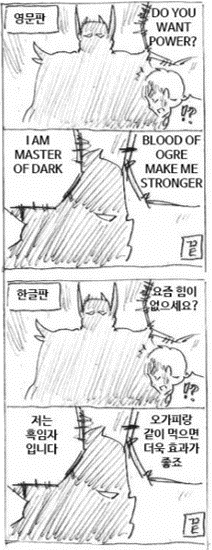프리랜서 번역가는 장기적인 전략을 가지고 비즈니스를 해 나가야 합니다. 시간 관리를 잘 해서 경험과 실력을 계속 쌓아나가고, 나쁜 에이전시와 거래를 끊고 점점 좋은 에이전시들과 관계를 맺고 유지해 나가야 합니다.
그런 장기적인 전망 없이 되는 대로 일을 하다 보면 앞으로 나아가지를 못하고, 그저 번역료를 깎는 것 외에는 수익 모델이 없는 한심한 에이전시와 계속 일을 하게 되죠. 다대다 번역 시장에서 그런 에이전시와 계속 일을 하고 있다면, 그건 누구의 잘못도 아닌 프리랜서 번역가 자신의 자기관리 실패, 장기적 전략 부재가 원인입니다.
그렇게 생각하지 않고 점점 더 시장이 나빠진다는 둥, 경기가 안 좋아서 그렇다는 둥, 업계의 관행이 점점 나빠진다는 둥 하는 쓸데없는 불평과 원망을 다른 사람들과 나누는 것은 한심한 것이고 시간 낭비일 뿐입니다. 어딘가 댓글 읽어 보니까 LinkedIn에 번역가들이 모여서 그렇게 자기들이 당하는 ‘억울한’ 일을 서로 공유하고 나쁜 에이전시 욕을 하고 그런 에이전시 블랙리스트를 만드는 곳이 있나 봐요. 참 딱한 일입니다.
그런 번역가들에게 Corinne이 따끔하게 한 마디 했더군요. 다음 글은 Corinne의 블로그에서 퍼 온 것입니다. 출처: http://thoughtsontranslation.com/2014/09/05/shouting-and-moaning-about-bad-clients-productive-or-not/
Shouting and moaning about bad clients: productive, or not?
September 5, 2014 by Corinne McKay
First, ranters, I hear you: bottom-feeding agencies, offering 2.765 cents a word for 8,000 words in two days are annoying. It’s doubly annoying that these bottom-rung agencies are, as Chris Durban found out in her “Mystery Shopper” experiment, telling clients that they provide high-quality translations by expert translators. As if Target said, “Shop here for heirloom-quality stuff that you’ll pass on to your grandchildren.” It also makes me sad (or maybe I’m just a bleeding heart…) that lots of translators see no way out of the bottom-rung market: they don’t know how to or don’t have the time to market themselves to better-paying clients, or they don’t know how to improve their translation or business skills so that they could work for better-paying clients, or they’re so busy cranking out the hoppers full of words at 2.765 cents each that they can only think about getting through the day.
At the same time, here’s my bottom line: if a client’s business model bugs you, simply don’t work for them and leave it at that. Just as I don’t give my money to Walmart or McDonald’s because I’m personally opposed to their business models and employment practices, I don’t work for bottom-rung clients because I choose to work for clients who value my work and are willing to pay accordingly. Why not rant? Here are my thoughts, but of course you can disagree:
- It’s a waste of time. I’m not going to put Walmart out of business by refusing to shop there, because tons of other people will still shop there. My goal isn’t to put them out of business, it’s to refuse to support them. You’re not going to put A+ Fast-n-Cheap Xlationz out of business by railing against them, because lots of clients will still use them, and lots of translators (for the reasons described above) will still work for them. If you want to put your emotions to a better use, do client outreach presentations to teach businesses how to choose a (real) high-quality translation provider; do presentations for other translators to teach them how to market themselves to better paying clients.
- As Chris Durban has commented before, ranting fosters a negative mindset about clients in general (they’re idiots, they don’t know anything about our work, they just want the fastest, cheapest translator out there, we should be suspicious of them until they prove otherwise). I’ll tell you–and lots of other premium-market translators will tell you–that’s not true. There are lots of clients out there who are not only willing but eager to pay real money to a highly-skilled professional who is consistent and confidential and responsive. But that work doesn’t fall into your inbox: you have to be out there looking for it, either online or in person or both; and realistically, most translators aren’t willing to do that or don’t know where to start.
- If you’re not in the bottom-rung market, it’s a completely different industry. I really don’t concern myself with the lowball market, any more than I concern myself with whether machine translation is going to put me out of business. Because in the end, it’s so different from what I do that it’s not even worth complaining about: sort of as if Major League Baseball complained that a middle school was holding a baseball game right next to their stadium and potentially siphoning off their spectators. When a client approaches me and their first question is “how much do you charge?,” I know that there’s a 90% chance that I’m not the right fit for them. I tell them that I understand the reality of budget constraints, but that I’m busy all the time at my regular rates, so they should find someone else. And I’m busy all the time at my regular rates because I’m “out there”–writing, speaking, attending conferences, meeting other translators who refer work to me, giving out information that potential clients find online, visiting my existing clients so that they keep using me, and so on. If it’s a choice between spending 10 minutes railing about “Get a load of what this parasitic agency asked me to do!!! Can you believe it!!” versus spending 10 minutes reading a potential client’s blog and commenting on it and maybe getting their attention in a positive way, to me, that’s a no-brainer.
Other thoughts on the rate rant?








